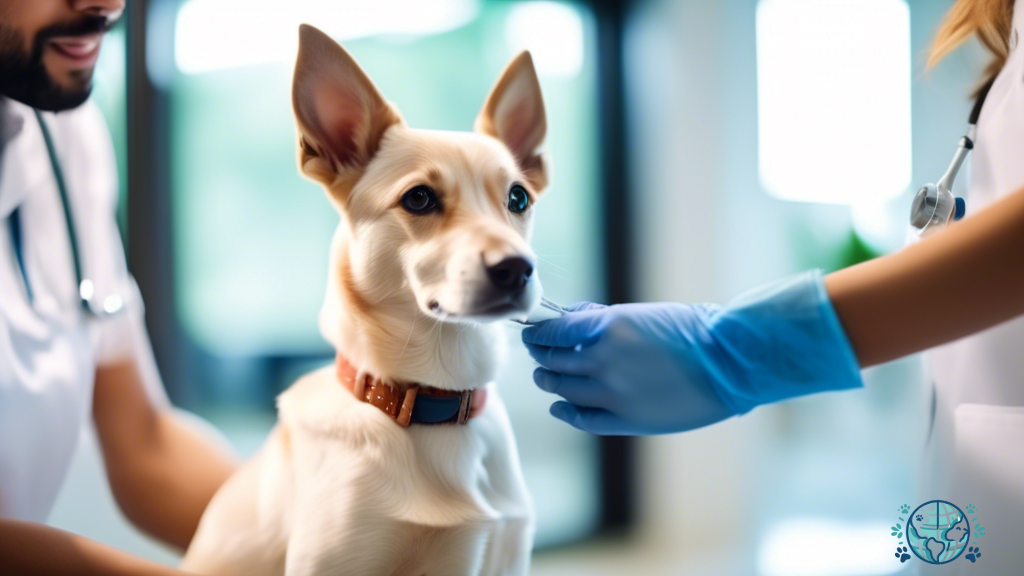Imagine embarking on a journey with your furry companion by your side, the wind in your hair, and the open road ahead of you.
But before you hit the road, it’s crucial to ensure that your pet is protected with the necessary travel vaccinations.
These vaccinations are not only important for your pet’s health and well-being but also for the safety of other animals they may come into contact with during your travels.
As you plan your next adventure with your pet, keep in mind the risks of traveling without proper vaccinations.
From exposure to infectious diseases to potential health complications, the importance of pet travel vaccinations cannot be overstated.
By taking the necessary precautions and consulting with your veterinarian, you can ensure a safe and enjoyable journey for both you and your beloved pet.
Key Takeaways
- Ensures health and safety of pets during travel
- Prevents exposure to diseases and health complications in unfamiliar environments
- Vaccination certificates are essential for legal requirements and peace of mind
- Consulting a veterinarian before traveling is crucial for proper vaccination recommendations and managing any health concerns
Understanding the Risks of Traveling with Pets
Before embarking on a journey with your furry friend, it’s crucial to understand the risks of pet travel and the importance of vaccinations to ensure their safety and well-being.
Traveling with pets can expose them to various diseases and illnesses, especially when visiting unfamiliar places or interacting with other animals. Without proper vaccinations, your pet could be at risk of contracting serious and potentially life-threatening illnesses, putting their health in jeopardy.
By taking the time to research and understand the risks associated with pet travel, you can make informed decisions to protect your furry companion.
Vaccinations play a vital role in preventing the spread of diseases and keeping your pet healthy and happy during their adventures. Prioritizing your pet’s health by ensuring they are up to date on their vaccinations will give you peace of mind and allow your furry friend to enjoy the freedom of exploring the world with you.
Common Pet Travel Vaccinations
Make sure your furry friend has all the necessary shots before embarking on any adventures abroad. Common pet travel vaccinations are essential to protect your pet from potential diseases they may encounter in different regions. These vaccinations not only keep your pet safe but also help prevent the spread of diseases to other animals or even humans.
Here is a breakdown of some common pet travel vaccinations that you should consider for your furry companion:
| Vaccination Type | Description | Recommended Frequency |
|---|---|---|
| Rabies | Protects against the rabies virus | Every 1-3 years |
| Canine Distemper | Guards against a highly contagious viral disease | Every 1-3 years |
| Canine Parvovirus | Prevents a potentially fatal virus affecting dogs | Every 1-3 years |
| Bordetella | Protects against kennel cough | Annually |
| Leptospirosis | Guards against a bacterial infection with various strains | Annually |
Ensuring your pet is up to date on these vaccinations will give you peace of mind knowing that they are protected during your travels. It’s important to consult with your veterinarian to create a vaccination plan tailored to your pet’s specific needs and the destinations you plan to visit. Travel with confidence, knowing your furry friend is well-prepared for any adventures that come your way.
Importance of Vaccination Certificates
Ensuring your furry friend has all required vaccination certificates is crucial for their safe travels and overall well-being. Without these certificates, your pet may face unnecessary risks and complications during their journey.
Here are four reasons why vaccination certificates are essential for your pet’s travel adventures:
- Legal Requirements: Many countries and airlines require proof of specific vaccinations to ensure the safety of all passengers, including pets. Having the necessary certificates can prevent delays, rejections, or even quarantines upon arrival.
- Health Protection: Vaccinations protect your pet from various diseases that they may encounter while traveling. By keeping their vaccinations up to date, you are safeguarding their health and well-being.
- Peace of Mind: Knowing that your furry companion is fully protected with the right vaccinations can give you peace of mind during your travels. You can focus on enjoying your journey without worrying about their safety.
- Emergency Situations: In case of any unforeseen emergencies or accidents during travel, having vaccination certificates readily available can expedite medical treatment for your pet. It can make a significant difference in critical situations.
Make sure to keep your pet’s vaccination certificates organized and easily accessible before embarking on any travel adventures. Your pet’s safety and well-being are worth the extra effort to ensure they have all the necessary protections in place.
Tips for Traveling Safely with Pets
To keep your furry friend safe on the go, remember to pack their favorite toys and blankets to comfort them during travel. Familiar items can provide a sense of security and ease any anxiety they may feel while away from home.
Additionally, make sure to bring along their food and water dishes, as well as any medications they may need during the trip. By keeping these essentials close at hand, you can ensure that your pet stays happy and healthy throughout the journey.
When traveling with pets, it’s important to plan ahead and make sure you have all the necessary supplies. Before hitting the road, research pet-friendly accommodations and activities at your destination to ensure a smooth and enjoyable trip for both you and your furry companion.
Remember to take frequent breaks during long drives to allow your pet to stretch, exercise, and relieve themselves. By taking these precautions and being prepared, you can make traveling with your pet a stress-free and memorable experience.
Consulting a Veterinarian Before Traveling
Don’t forget to consult with a veterinarian before hitting the road with your furry friend! Your pet’s health and safety are a top priority, so make sure to schedule a visit with the vet to ensure they are ready for the journey ahead.
Here are some key points to discuss with your veterinarian:
- Current health status of your pet
- Any existing medical conditions or concerns
- Recommended vaccinations for travel
- Ensure your pet is up to date on all necessary vaccinations
- Tips for managing any travel anxiety or motion sickness
- Strategies to help your pet stay calm and comfortable during the trip
Taking the time to consult with a veterinarian before traveling with your pet can help you address any potential health issues and ensure a smooth and safe journey. Your furry companion will thank you for taking the necessary precautions to keep them healthy and happy on the road.
Frequently Asked Questions
Are there any alternative methods to vaccines for protecting pets during travel?
If you’re looking to protect your pet during travel without vaccines, consider using natural remedies like essential oils or herbal supplements. While not as effective as vaccines, these alternatives can provide some level of protection.
How long do pet travel vaccinations typically last before needing to be updated?
Pet travel vaccinations typically last 1-3 years before needing to be updated. It’s crucial to stay on top of these updates to ensure your furry friend is protected while exploring the world with you.
Can certain breeds or species of pets have different vaccination requirements for travel?
Yes, certain breeds or species of pets may have different vaccination requirements for travel. It’s important to research specific needs based on your pet’s breed or species to ensure they meet all necessary requirements.
Are there any potential side effects or risks associated with pet travel vaccinations?
Potential side effects of pet travel vaccinations can include mild fever, lethargy, or soreness at the injection site. However, these risks are minimal compared to the benefits of protecting your furry companion on adventures.
What steps should be taken if a pet has a negative reaction to a vaccination while traveling?
If your pet has a negative reaction to a vaccination while traveling, immediately contact a local veterinarian for guidance. Monitor your pet closely, provide comfort, and follow any instructions given to ensure their well-being and recovery.
Last Updated: February 21, 2024
Disclosure: We may receive affiliate compensation for some of the links in this article at no additional cost to you if you decide to purchase a product. You can read our affiliate disclosure in our privacy policy.
Kevin Fairbanks is your go-to guide for all things pet travel. With a passion for adventure and a heartwarming love for his two feline companions, Spooky and Penelope (lovingly known as Nelly), Kevin understands the joys and challenges of exploring the world with furry friends.
As an avid traveler and a nature enthusiast, Kevin is no stranger to the great outdoors. Whether he’s camping under the starry skies or exploring pet-friendly cityscapes, he’s always on the lookout for new experiences to share with pets and pet owners alike.
Kevin’s journey into the world of pet travel was inspired by his beloved Chihuahua, Lola, who recently crossed the Rainbow Bridge. Her memory lives on through the valuable insights and tips he provides to fellow travelers.
Join Kevin as he combines his passion for adventure, love for pets, and wealth of knowledge to help you navigate the exciting world of pet-friendly travel. Whether you’re planning a pet passport adventure or seeking the best cat-friendly lodging, Kevin has you covered.
Follow along with Kevin’s adventures and gain valuable insights into making your pet travel experiences memorable and stress-free.
Verified and Approved by:

Kevin Fairbanks
Head of SEO
Like This Article?
Share with your friends
Table of Contents
Latest Articles
Keep Reading
-
Discover Pet-Friendly Hiking Trails In The UK
Embark on exciting adventures with your furry companion on pet-friendly hiking trails in the UK. Discover breathtaking scenery and create unforgettable memories together. Start exploring now and unleash your pet’s adventurous spirit!
-
Pet Travel Quarantine: What You Need To Know
Planning to travel with your pet? Learn all about pet travel quarantine and ensure your furry friend doesn’t miss out on adventures. Click now for essential information!
-
Enjoy A Purrfect Vacation: Cat-Friendly Vacation Rentals
Escape to paradise with our cat-friendly vacation rentals! From charming cabins to luxurious villas, pamper yourself and your feline companion on a purrfect getaway. Book now for a meow-nificent adventure!




